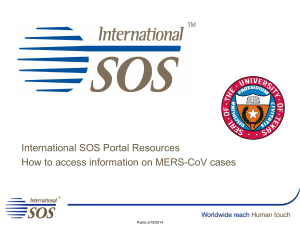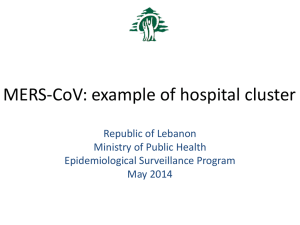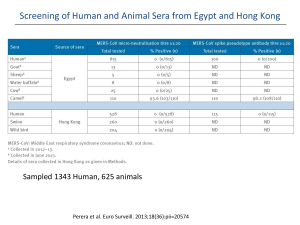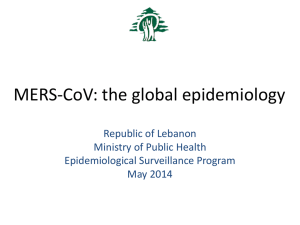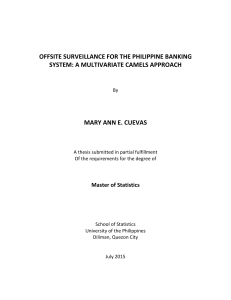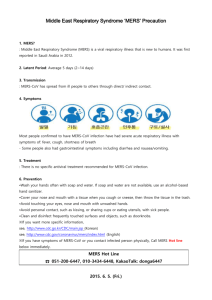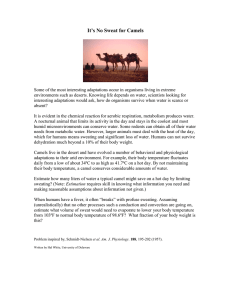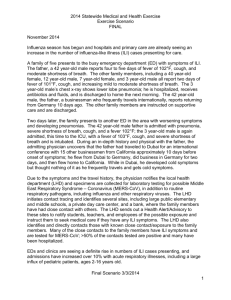Middle East respiratory syndrome coronavirus (MERS-CoV) 13 June 2014
advertisement
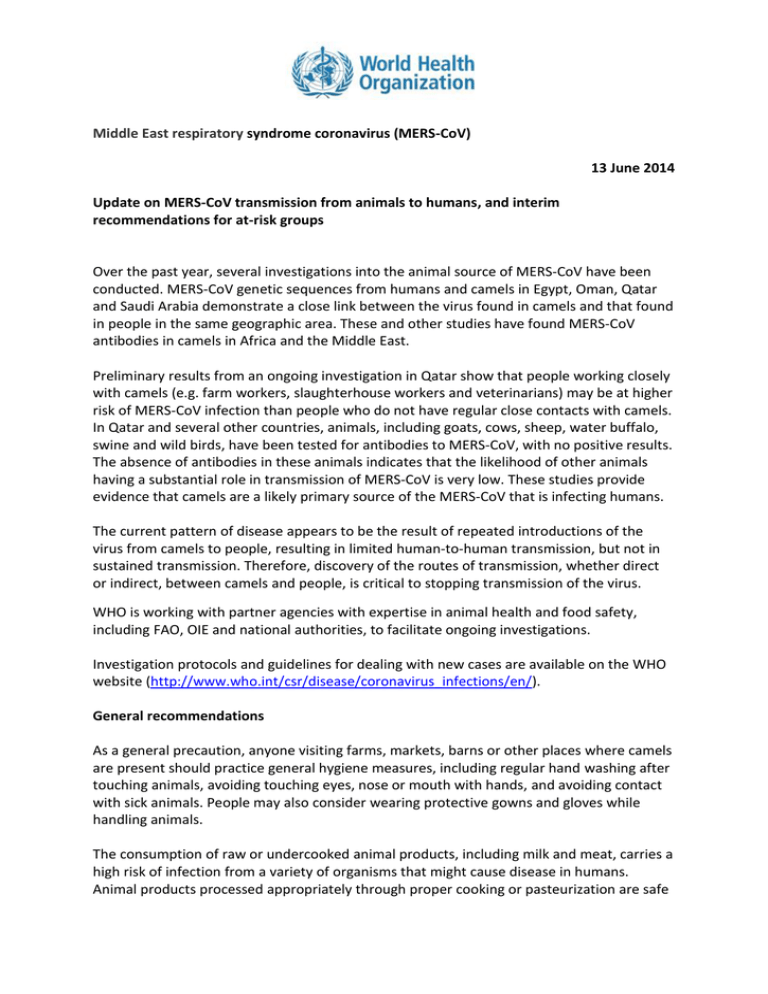
Middle East respiratory syndrome coronavirus (MERS-CoV) 13 June 2014 Update on MERS-CoV transmission from animals to humans, and interim recommendations for at-risk groups Over the past year, several investigations into the animal source of MERS-CoV have been conducted. MERS-CoV genetic sequences from humans and camels in Egypt, Oman, Qatar and Saudi Arabia demonstrate a close link between the virus found in camels and that found in people in the same geographic area. These and other studies have found MERS-CoV antibodies in camels in Africa and the Middle East. Preliminary results from an ongoing investigation in Qatar show that people working closely with camels (e.g. farm workers, slaughterhouse workers and veterinarians) may be at higher risk of MERS-CoV infection than people who do not have regular close contacts with camels. In Qatar and several other countries, animals, including goats, cows, sheep, water buffalo, swine and wild birds, have been tested for antibodies to MERS-CoV, with no positive results. The absence of antibodies in these animals indicates that the likelihood of other animals having a substantial role in transmission of MERS-CoV is very low. These studies provide evidence that camels are a likely primary source of the MERS-CoV that is infecting humans. The current pattern of disease appears to be the result of repeated introductions of the virus from camels to people, resulting in limited human-to-human transmission, but not in sustained transmission. Therefore, discovery of the routes of transmission, whether direct or indirect, between camels and people, is critical to stopping transmission of the virus. WHO is working with partner agencies with expertise in animal health and food safety, including FAO, OIE and national authorities, to facilitate ongoing investigations. Investigation protocols and guidelines for dealing with new cases are available on the WHO website (http://www.who.int/csr/disease/coronavirus_infections/en/). General recommendations As a general precaution, anyone visiting farms, markets, barns or other places where camels are present should practice general hygiene measures, including regular hand washing after touching animals, avoiding touching eyes, nose or mouth with hands, and avoiding contact with sick animals. People may also consider wearing protective gowns and gloves while handling animals. The consumption of raw or undercooked animal products, including milk and meat, carries a high risk of infection from a variety of organisms that might cause disease in humans. Animal products processed appropriately through proper cooking or pasteurization are safe for consumption but should also be handled with care, to avoid cross-contamination with uncooked foods. Recent studies in Qatar show that MERS-CoV can be detected in raw milk from infected camels. Whether camels excrete MERS-CoV in milk or the virus gets into the milk through cross-contamination during milking is unclear. However, if MERS-CoV is present, it will be destroyed by pasteurization or cooking. Camel meat and camel milk are nutritious products that can continue to be consumed after cooking, pasteurization, or other heat treatments. Safe alternatives should be developed to the tradition of sales of raw camel milk for direct consumption, along roadsides and farm gates. Recommendations for at-risk groups Until more is understood about MERS, people with diabetes, renal failure, chronic lung disease, and immunocompromised persons are considered at high risk of severe disease from MERS-CoV infection. Therefore, these people should avoid contact with camels, should not drink raw camel milk or camel urine, and should not eat meat that has not been properly cooked. Such recommendations should also be disseminated to travellers, tourists and pilgrims with above mentioned underlying conditions coming to the region from around the world. Preliminary results from recent studies in Qatar indicate that people handling or working with camels are at increased risk of infection with MERS-CoV compared with people who do not have contact with camels. Until more evidence is gathered, it is prudent for camel farm workers, slaughterhouse workers, market workers, veterinarians and those handling camels at racing facilities to practice good personal hygiene, including frequent hand washing after touching animals. They should wear facial protection where feasible and protective clothing, which should be removed after work and washed daily. Workers should also avoid exposing family members to soiled work clothing, shoes, or other items that may have come into contact with camel excretions. It is therefore recommended that these clothes and items remain at the workplace for daily washing and that workers have access to and use shower facilities at their workplaces before leaving the premises. Camels infected with MERS-CoV may not show any signs of infection. It is therefore not possible to know whether an animal in a farm, market, race track or slaughterhouse is excreting MERS-CoV that can potentially infect humans. However, infected animals may shed MERS-CoV through nasal and eye discharge, faeces, and potentially in their milk and urine. The virus may also be found in the organs and meat of an infected animal. Therefore, until more is known about infection in animals, the best protection is to practice good hygiene and avoid direct contact with all of these. Obviously sick animals should never be slaughtered for consumption; dead animals should be safely buried or destroyed. People who are not wearing protective gear should avoid contact with any animal that has been confirmed positive for MERS-CoV until subsequent tests have confirmed that the animal is free of the virus.
